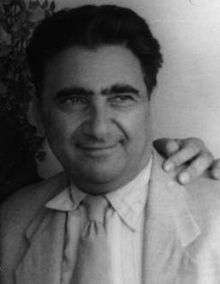Abdossamad Kambakhsh
Abdolsamad Kambakhsh (Persian: عبدالصمد کامبخش, romanized: ʿAbd-ul-Ṣamad Kāmbaḵš) akso know by his aliases as Abdolsamad Qanbari or the Red Prince, was an Iranian communist political activist and a founding member of the Tudeh Party of Iran.
Abdolsamad Kambakhsh | |
|---|---|
 | |
| Member of Parliament of Iran | |
| In office 6 March 1944 – 12 March 1946 | |
| Constituency | Qazvin |
| Personal details | |
| Born | 1902 or 1903 Qazvin, Persia |
| Died | 1971[1] Leipzig, East Germany |
| Nationality | Iranian |
| Political party | Tudeh Party (1943–1971) Communist Party of Persia (1920s) |
| Other political affiliations | Communist Party of the Soviet Union |
| Relatives | Noureddin Kianouri (brother-in-law)[1] |
| Alma mater | Moscow University |
| Military service | |
| Branch/service | Air Force |
| Years of service | 1932–1937 |
| Rank | Second lieutenant |
A member of the "group of fifty-three",[2] he was an influential member of the Tudeh Party of Iran and belonged to the party's hardline faction.[3] Kambakhsh was known for his close connections to the Soviet intelligence agencies, including OGPU, NKVD and the KGB.[4]
Scholar Maziar Behrooz argues that "Kambakhsh was not a theorist but a party functionary with strong personal connections to the Soviets".[5]
Early life and education
Kambakhsh was born in 1902[2] or 1903[6] in Qazvin, and came from an aristocrat Qajar family.[2] He was grown up in his birthplace,[6] and went to study in Soviet Union in 1915.[7] Inspired by the Russian Revolution, he returned to Iran and joined the Socialist and Communist parties.[7] He then resided in Tehran became a factory manager.[2] Despite his political leanings, the Persian government granted him a scholarship in 1927 and he was sent to Russia for university.[7] At Moscow University,[2] he studied aeronautics between 1928 and 1932.[8]
Career
He represented Tudeh in the 22nd Congress of the Communist Party of the Soviet Union.
According to written statements of Khosro Rouzbeh in military court, Kambakhsh initiated the activities of Tudeh Military Network in early 1944.[9]
In the first congress of Tudeh held in August 1944, Kambakhsh was elected to the central committee.[9]
After the 1946 Azerbaijan revolt, he was prosecuted with a warrant and as a result he fled the country.[9] The military tribunal sentenced him to death in absentia, forcing him into exile until his death.[2]
References
- Keshavarz, Fereydoun (July–August 1981). "Tudeh's Policy is a Betrayal of the Working Class". MERIP Reports (Interview). Iran Two Years After (98). Interviewed by Fred Halliday. Middle East Research and Information Project: 26–27, 31. JSTOR i350683.
- Abrahamian, Ervand (1999). Tortured Confessions: Prisons and Public Recantations in Modern Iran. University of California Press. p. 50. ISBN 0520922905.
- Gasiorowski, Mark J.; Byrne, Malcolm (2004). "Makki". Mohammad Mosaddeq and the 1953 Coup in Iran. Syracuse University Press. pp. 60–62. ISBN 0815630182.
- Chaqueri, Cosroe (December 15, 1998) [January 19, 2012]. "ESKANDARĪ, ĪRAJ". In Yarshater, Ehsan (ed.). Encyclopædia Iranica. Fasc. 6. VIII. New York City: Bibliotheca Persica Press. pp. 604–606. Retrieved September 12, 2017.
- Behrooz, Maziar (August 2001). "Tudeh Factionalism and the 1953 Coup in Iran". International Journal of Middle East Studies. 33 (3): 363–82. doi:10.1017/S0020743801003026. JSTOR 259456.
- Shirali, Mahnaz (2017). The Mystery of Contemporary Iran. Routledge. ISBN 9781351479134.
- Abrahamian, Ervand (1982). Iran Between Two Revolutions. Princeton University Press. p. 296. ISBN 0-691-10134-5.
- Ghods, M. Reza (1990). "The Iranian Communist Movement under Reza Shah". Middle Eastern Studies. Taylor & Francis. 26 (4): 506–513. JSTOR 4283395.(subscription required)
- Miyata, Osamu (July 1987), "The Tudeh Military Network during the Oil Nationalization Period", Middle Eastern Studies, 23 (3): 313–328, doi:10.1080/00263208708700709, JSTOR 4283187
| Party political offices | ||
|---|---|---|
| Preceded by Iraj Eskandari |
Second Secretary of the Tudeh Party of Iran 1969–1971 |
Succeeded by Noureddin Kianouri |
| Preceded by Ardeshir Ovanessian as Caretaker |
Secretary-in-Charge of the Tudeh Military Network 1944–1946 | |